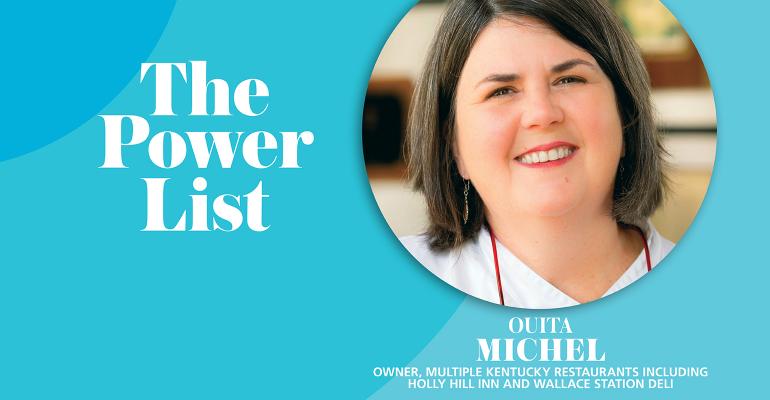Ouita Michel, owner of multiple Kentucky restaurants including Holly Hill Inn, Wallace Station Deli and Windy Corner Market, was chosen for the Power List by Rohini Dey of Chicago’s Vermillion and founder of Let’s Talk for how she is building community among businesswomen in the industry. Here’s what else Dey had to say:
Nominated for Restaurateur of the Year by the James Beard Foundation twice, she runs an empire of nine restaurants. Ouita is also the lead for Let’s Talk Louisville/Lexington that now includes Cincinnati. I’ve never met Ouita in person, but I see her in action in every one of our Let’s Talk sessions. Her glowing presence is nourishing and encouraging. Ouita is no pushover though, her asks are firm and pointed – I love that about her. Our goals for Let’s Talk are building camaraderie and a support network for each other, combining scale for visibility, and joint economic initiatives. Ouita does this effortlessly and masterfully.
Nation’s Restaurant News talked with Ouita Michel about how she’s working to elevate and empower female business leaders in her region. Here’s what she had to say:
What’s the biggest lesson you’ve learned during this chaotic year?
Learning to reach out and talk openly with other women business owners and operators about the issues they are also confronting. Rohini drew me into that process, I must admit rather reluctantly, but engaging in “Let’s Talk” quickly transformed my thinking from one of mental and emotional isolation to that of being part of an extended community. The comfort and strength of our numbers and our common issues along with the networking of solutions was eye-opening and will result in strong, long lasting relationships and networks that will sustain us all in years to come. My aim for this entire period was to come back better — in every one of our restaurants, and personally. The relationships built in the “Let’s Talk” network will make that possible.
The uncertainty of the year and the difficulties of having our dining rooms closed forced us very quickly into new operating strategies. In the midst of that intense change, I learned to focus very clearly and intently on our company’s true mission and why I got into this business in the first place — to bring others a measure of memory and happiness, to prepare beautiful and delicious food — from the sandwich concept to the fine dining table, and to increase farm income in Kentucky. That focus helped me make decisions that propelled us forward, but not lose sight of who we are as a group.
What are you most proud of in terms of company leadership and community impact as you look back at the challenges of 2020?
I am really proud of helping to build a new community of sister business owners across Lexington, Central Kentucky, Louisville, Northern Kentucky and Cincinnati. What started with a simple monthly phone conversation is going to translate into a very dynamic group online and on the ground of women business owners in food, beverage, and hospitality, including producers, restaurateurs, caterers, processors, bar owners, winery owners, brewery owners and distillers. Our website, Kentucky Duchess, be launched by mid-January of 2021. It includes a statewide directory of women owned food and beverage businesses including producers, with pages for our friends across the Ohio River in Indiana and Cincinnati. We hope to road map these business for tourism, media, and to help bond us together for collaborative events. I know this will be instrumental in helping small women owned businesses across Kentucky get the promotion and recognition they need.
On a personal level, we cared for our restaurant family — keeping everyone enrolled in health insurance, distributing emergency funds and meals to employees in need and keeping our payroll as intact as possible. We have kept our employees healthy at work and fostered an atmosphere of transparency and safety for our staff and our guests with strict compliance to occupancy restrictions, mask wearing, testing and when necessary isolation. It has worked, and despite some positive test results, they remained isolated and our staff has stayed healthy.
 How are you or your company fostering diverse and inclusive future leaders of foodservice?
How are you or your company fostering diverse and inclusive future leaders of foodservice?
“Let’s Talk” in Kentucky has reached out to businesswomen of all kinds, from the small breakfast cafe, to a large multi-unit bakery and coffee establishment. It is striking in our conversations, how young the women are, and how diverse — from every different ethnic background. Some are very plugged into established business organizations locally; some have never been part of a business organization. In our community often women business owners in foodservice feel outside the norm of the business community, especially if they are young and owner operators. “Let’s Talk” put us all on equal footing and I think it is going to be exciting to see how powerful this group can really be in our respective communities.
What does leadership and impact mean to you?
“You can get a lot done if you do not care who gets the credit,” was repeated over and over in our household when I was growing up. Allowing others to take credit invests folks in a process and a vision that you share and creates growth. Our progress as a “Let’s Talk” Group is not because of my emails about logging into our monthly calls; it is because participants came together outside of our calls to create something special. Linking people together can change the conversation in our state about small business ownership and what it actually looks like and how it can transform our urban and our rural communities.
Read more:






